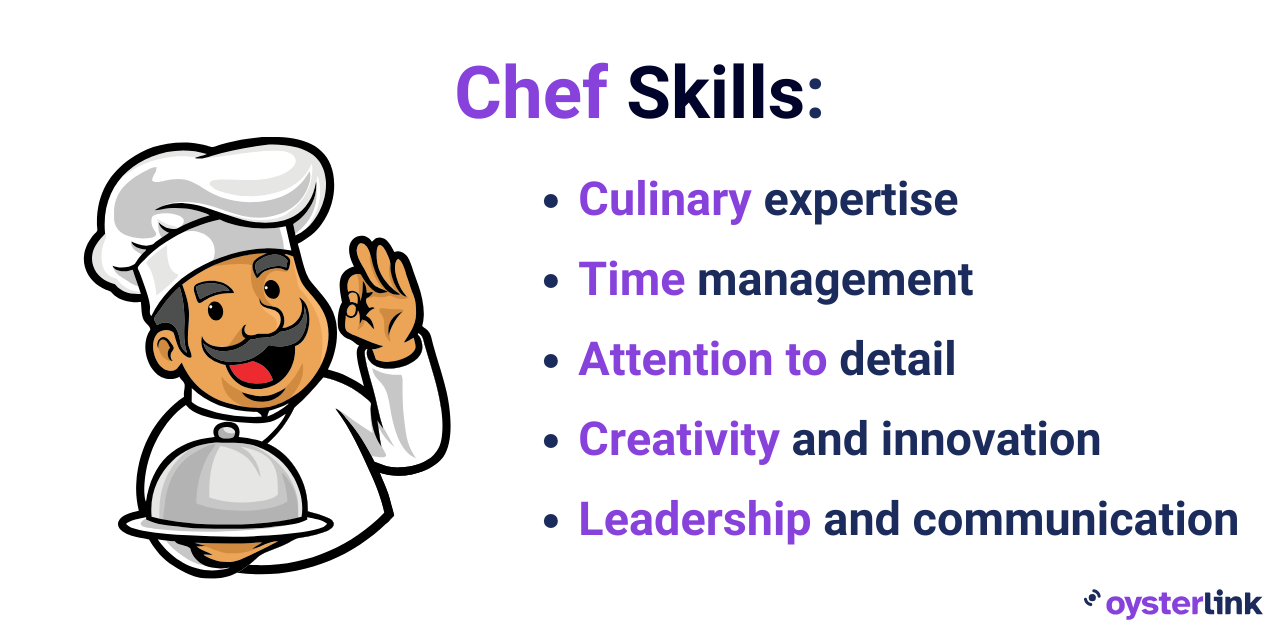Top 50 Chef Interview Questions & How To Answer Them
In this guide, we’ll take a look at some essential interview questions for a Chef to help both employers and applicants prepare for the hiring process in the competitive restaurant industry.
Popular Chef Interview Questions
Below you'll find the most common interview questions for the role of a Chef, neatly organized into categories for better readability and clarity.
Types of Chef Interview Questions
- Skills and experience Chef interview questions: This set of interview questions for Chef is designed to inquire about the candidate’s skills and experience as a Chef.
- Customer service Chef interview questions: These customer service interview questions to ask a Chef to help assess the applicant’s interpersonal skills and abilities. Look for an individual who can deliver superior customer service both inside and outside of the kitchen.
- Technical Chef interview questions: Use these technical questions to ask a Chef in an interview to assess the applicant’s ability to adapt to changing and unforeseen situations that can arise in the restaurant environment.
What Are the Top Chef Interview Questions and Answers?
In addition to the Chef interview questions and answers PDF above, we've compiled a list of a few more questions you can expect during your next interview.
How To Become a Chef?
While formal education isn’t necessarily required to become a Chef, having a culinary degree will help you with Chef job interview questions and answers and land the Chef job of your dreams.
To help you become a Chef, we have an article explaining how to become a Chef in 5 simple steps, which goes over everything you need to do to succeed in this role.

Testimonial From a Renowned Private Chef
What is the most important trait a Chef can have to succeed?
"Patience. Having the ability to slow your mind amidst the chaos is extremely powerful. As a Chef, you are pulled in so many directions at once. Whether it’s in the middle of service, managing your business or developing team members, being patient so you can problem solve thoroughly yet quickly is paramount."
How To Prepare for a Chef Interview
There are currently more than 172,000 individuals working as Chefs in the United States.
With the increasing number of Chef positions, it is important to stand out in this competitive market. That's why the questions to ask a Chef during an interview above are good to study and analyze.
In addition, we have a few more tips and tricks to share with you to prepare for your Chef interview, both as a candidate and as an applicant.
As a candidate:
- Before the interview, thoroughly research the restaurant's concept, cuisine and philosophy. Demonstrating knowledge of the restaurant's identity and market position shows your genuine interest and how you can contribute to its vision.
- Share specific experiences with advanced culinary techniques, innovative menu development and effective ingredient sourcing. This not only highlights your skills but also your ability to enhance the restaurant's offerings.
- Talk about your experience in leading kitchen teams, managing service under pressure and nurturing talent. Provide examples that show your leadership style and how it aligns with the collaborative or hierarchical structure of the prospective kitchen.
As an interviewer:
- Ask targeted questions about technical culinary skills, unique cooking techniques and experiences with cuisine types relevant to your establishment to gauge depth of knowledge and adaptability.
- Inquire about candidates' approaches to team management, conflict resolution and staff development, looking for a balance of assertiveness and empathy crucial for kitchen harmony.
- Discuss candidates' experiences with menu pricing, supplier negotiations and cost control measures. This reveals their ability to balance culinary creativity with the restaurant's financial health.
Are Chefs Paid Well?
The compensation for Chefs can vary widely depending on several factors, including geographical location, the type of establishment they work for and their level of experience.
While Chefs in high-end restaurants and luxury hotels may receive competitive salaries, entry-level Chef positions in smaller or less prestigious venues may not be as lucrative. Remember that how well you answer Chef de Partie interview questions during the hiring process also plays a role in how much you can earn.
There's also a growing trend for Chefs to explore alternative revenue streams, such as television appearances, cookbook publishing and product endorsements, which can significantly increase their earnings.




